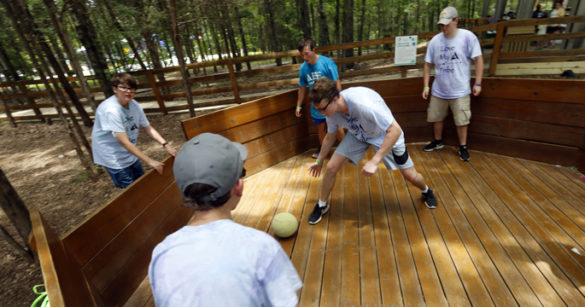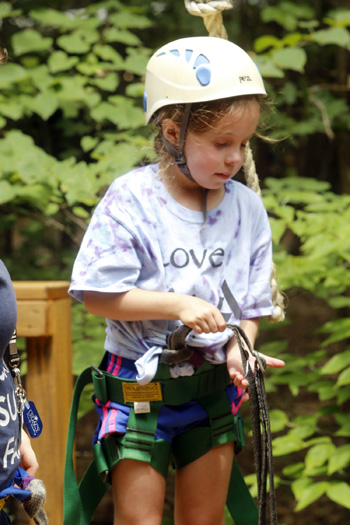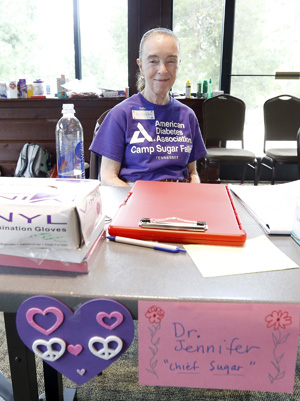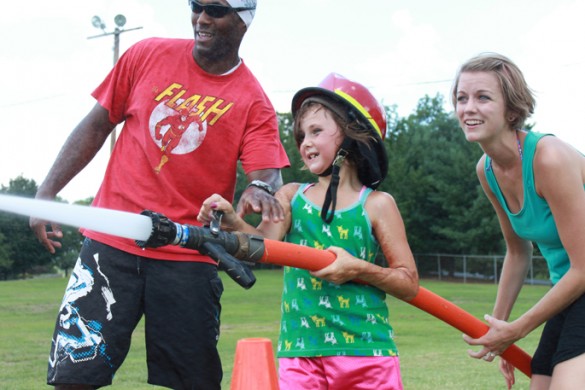
In between zip-lining through the woods and playing ball, 13-year-old Rhett Stanley takes a break from summer camp, pulls a tiny bag from his backpack and quickly tests his blood glucose level. Then, just as quickly, he’s back to the fun.
Every summer, Stanley and other Middle Tennessee children ages 6-17 diagnosed with Type-1 or Type-2 diabetes enjoy a weeklong day-camp called Camp Sugar Falls tailored just for them.
The experience comes complete with every activity you’d expect at a traditional summer camp but with medical professionals trained in diabetes management on site to assist, if needed.
A partnership between Vanderbilt University Medical Center (VUMC) and the American Diabetes Association (ADA), Camp Sugar Falls provides recreational and educational activities focused on nutrition, lifestyle habits and self-esteem in a setting that is much more exciting than a doctor’s office. Also, because it helps their brothers and sisters better understand diabetes, campers’ siblings are invited to attend as well.

Vanderbilt pediatric endocrinologist Jennifer Najjar, M.D., associate professor of Clinical Pediatrics, started the camp 35 years ago as a way to help children diagnosed with diabetes deal with the challenges of managing the disease. That first year, Najjar had eight children sign up for camp sessions at a picnic pavilion at Nashville’s Centennial Park, and it’s grown steadily ever since.
To date, about 2,000 campers have participated in Camp Sugar Falls. Many return year after year and then serve as counselors after they are too old to be campers. This year, 92 campers participated, overseen by 15 VUMC medical staff members, 15 students from Belmont University College of Pharmacy, six representatives from the ADA and several YMCA camp counselors.
“Everything we do here — all the games and activities — are centered around medical education and nutrition,” Najjar said. “We know they’re going to be making food choices every day, and that is the key for healthy diabetes management. We help them interpret their blood sugars while they’re here, and we talk with them about how important it is to time their insulin properly. The kids don’t really realize how much they are learning because they are having so much fun.”
Rhett’s mother, Deborah Stanley, signed her son up for the fifth year at Camp Sugar Falls, and said the friendships and support he’s gained have been priceless. He’s also learned how to better monitor his blood glucose and administer his own insulin.
“This is wonderful — it’s like the Disney World of camps,” she said. “It’s taught him to be more personally responsible for his health, and I don’t worry about him at all when he’s here.”

The camp boosts campers’ knowledge and ability to care for themselves, but it also helps them not feel so isolated because they meet and form lifelong friendships with other children who share a diabetes diagnosis, Najjar said. The camp also gives their parents and caregivers a small break, with the peace of mind that their children are enjoying camp with medical professionals on hand every day.
Campers will tell you it’s their favorite week of the year, but they are not alone. Medical staff and other volunteers make the camp successful, often taking their own vacation time to do so, and just like the campers, they usually come back year after year.
Melissa Wilson, community health strategist with the ADA, organizes and administers the camp, and she was diagnosed with Type 1 diabetes herself at age 23.
“It is an emotional journey to go through having to prick your finger, and not being able to eat everything you want to or participate in an activity when you want to,” she said. “When you’re a kid, that might not seem fair. They didn’t ask to have diabetes. Here, they see other kids who are learning to deal with this just like them, and it becomes the norm. They have the support they need, and, best of all, they’re having fun.”














